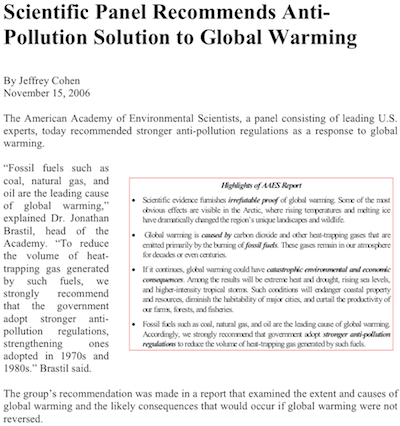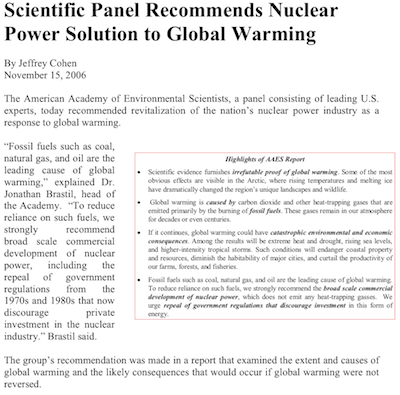David Appell, writing for the Yale Forum on Climate Change and the Media, observes climate change deniers urging geoengineering as a solution to climate climate change. (Geoengineering is the intentional modification of the atmosphere to change the climate in controlled ways.) They may not think climate change is real, or problematic, but they know how to solve it!

 This isn’t as surprising as it might seem. Dan Kahan and his colleagues at the Cultural Cognition Project got a comparable effect by giving people one of two fake newspaper articles about climate change. Each contained an identical summary of the science of climate change, its human causes, and dangerous consequences, attributed to the fictional American Academy of Environmental Sciences (AAES). In one version of the article, the AAES concluded that the solution to climate change was to reduce regulation on the nuclear industry, allowing more electricity to be produced without burning fossil fuels. In the other article the AAES argued for increased industrial regulation to reduce fossil fuel emissions.
This isn’t as surprising as it might seem. Dan Kahan and his colleagues at the Cultural Cognition Project got a comparable effect by giving people one of two fake newspaper articles about climate change. Each contained an identical summary of the science of climate change, its human causes, and dangerous consequences, attributed to the fictional American Academy of Environmental Sciences (AAES). In one version of the article, the AAES concluded that the solution to climate change was to reduce regulation on the nuclear industry, allowing more electricity to be produced without burning fossil fuels. In the other article the AAES argued for increased industrial regulation to reduce fossil fuel emissions.
The researchers randomly assigned these articles to readers whose demographic background would predispose them to reject climate change (such folks tend also to object to government regulation and to view the nuclear industry favorably). Those who were given the pro-nuclear version of the article were more likely to agree that climate change is happening than similar people who read the pro-regulation article. In other words, the subject's perception of the solution changed their willingness to acknowledge the existence of a problem.
In this light, the denialist movement’s support of geoengineering isn’t surprising. As Appell observes (citing Clive Hamilton’s book Earthmasters), “this pair of positions maintains the dominant power structures of society, especially the roles of the energy mega-corporations that have a great deal to lose from any shift away from fossil fuels.” Geoengineering would be a large industrial enterprise, it doesn’t necessarily require changes in industrial emissions (though geoengineering is most plausible as a supplement to emissions reduction, not as a replacement), and it doesn’t require individual behavior change. All these factors make it amenable to the politically and economically conservative outlook that tends to drive climate change denial.
There are parallels in the psychology of creationism. One of the most effective ways to break down anti-evolution sentiment is to help people recognize that accepting evolution need not threaten their religious beliefs. Similarly, climate change deniers are less likely to reject the science if their fear of the economic and political consequences is allayed.
That said, I’m not quite sure how to extend the analogy to this geoengineering example. In this case, the deniers embraced a solution to climate change without acknowledging the reality of climate change. Is there a case where creationists acknowledge a scientific or religious perspective or conclusion that might seem to demand acceptance of evolution, but which they nonetheless use to weaken support for evolution?
Images from Figure 17 of Dan Kahan (2008) “Cognition as a Conception of the Cultural Theory of Risk,” Handbook of Risk Theory, Harvard Law School Program on Risk Regulation Research Paper No. 08-20; Yale Law School, Public Law Working Paper No. 222. Available at SSRN: http://ssrn.com/abstract=1123807

